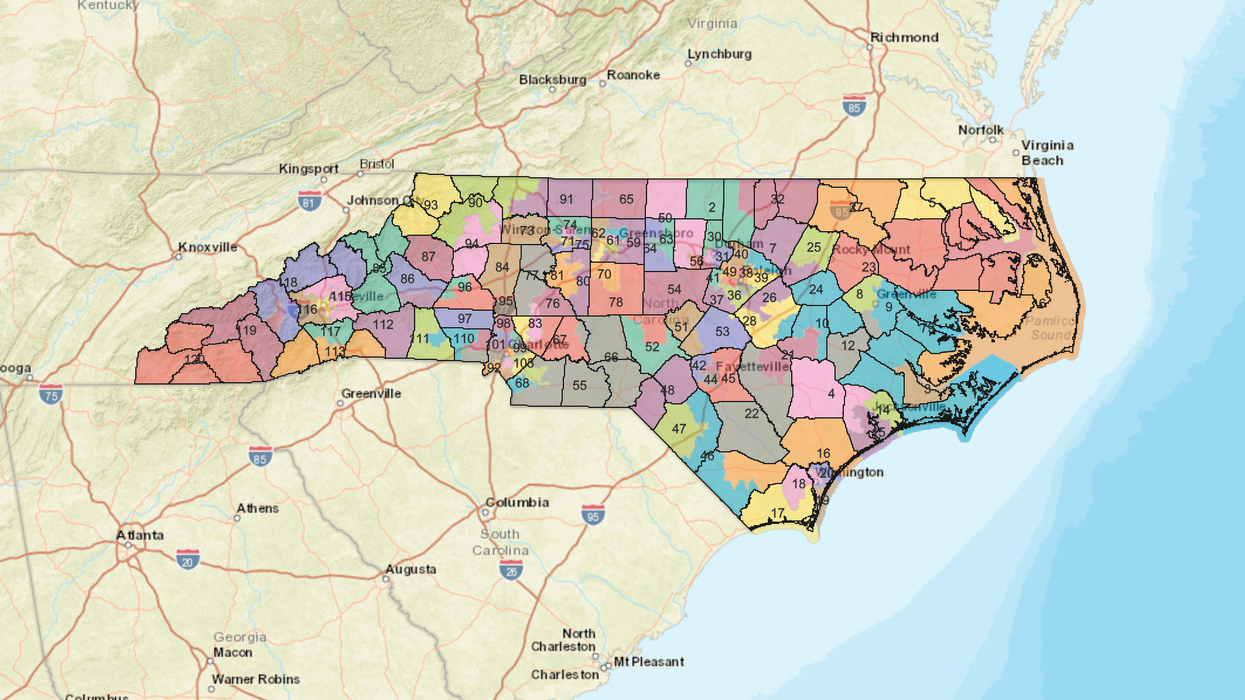The Supreme Court's landmark ruling that federal judges are powerless to police political gerrymandering is not going to be the final word on the matter from an American courthouse.
Opening arguments were heard Monday in a state court lawsuit challenging the work of North Carolina's aggressive Republican mapmakers, the same folks whose work on congressional districts survived a high court challenge in Washington just three weeks ago.
But this time, the plaintiffs (led by Common Cause) are challenging the boundaries of state legislative districts — alleging they abridge North Carolina's constitutional rights to freedom of assembly and equal protection and so should be tossed out, even if they can no longer be challenged as violating the U.S. Constitution.
"Republicans in the General Assembly have manipulated the district lines to guarantee that their party will control both the state House and the state Senate, regardless of how people vote," attorney Stanton Jones declared as what's expected to be a two-week civil trial got underway before a panel of three state judges in Superior Court in Raleigh. "This attack on representative democracy and voting rights is fundamentally unfair."
The attorney for the Republican legislative leaders, Phillip Strach, countered that plaintiffs were seeking to be rescued by "judicial fiat" from the normal consequences of electoral, legislative and even demographic processes, including that Democrats tend to cluster in cities and so don't compete in many suburbs or rural areas.
"This lawsuit is not about protecting democracy," Strach said. "It is a full-frontal assault on democracy."
Challenges like this one are sure to become more common in light of the Supreme Court's ruling three weeks ago, in which the five conservative justice agreed that federal courts have no role in addressing even the most dramatically partisan gerrymanders — those drawn by the party in power in order to stack the deck disproportionally against the other party, even when voter behavior makes plain the desire for an allocation of seats that's closer to even.
Republicans, who have benefitted much more from partisan gerrymandering in this decade, are on alert for the potential their efforts will eventually get undone by these state court challenges.
Former Wisconsin Gov. Scott Walker has taken the lead in combatting this strategy as chairman of the National Republican Redistricting Trust, which will coordinate the party's redistricting strategy after the 2020 census. After the Supreme Court decision he warned members of his party against resting easy. "Now, more than ever, we need all Republicans to join us or we will find ourselves gerrymandered into perpetual minorities by liberal state supreme courts," he wrote on Twitter.
Challenges similar to the new one in North Carolina have been filed in Michigan, Ohio, Georgia, Texas, Louisiana, Connecticut, Mississippi, Alabama and Maryland. But none has yet gone to trial.
One such challenge, however, has already produced an enormously consequential victory for opponents of partisan mapmaking, and for Democrats. Last year, in one of the biggest purple states in the nation, the Pennsylvania Supreme Court declared that the state's constitution was violated by a map drawn by GOP legislators to assure that 12 of the state's 18 congressional districts would be filled by Republicans. Under the new map ordered by the court, the state elected nine House members from each party in the 2018 midterm.
But in North Carolina, even though Republican legislative candidates received less than half the overall vote, district-by-district results yielded a 10-seat advantage for the GOP in the state House and a seven-seat edge in the state Senate.
The trial over the those maps will feature many of the same arguments that permeated the litigation that challenged the state's congressional map, with has reliably led to wins for Republicans in 10 of the 13 districts. One important thing will be different, however: The plaintiffs will be able to present evidence from the files of the late Tom Hofeller, a GOP gerrymandering wizard who helped the North Carolina mapmakers in maximizing their partisan advantage.
The plaintiffs are particularly optimistic about their chances because, no matter what the trial verdict, the case looks destined for final disposition at the Supreme Court of North Carolina, where judges elected as Democrats hold six of the seven seats. Although the new case is just about state legislative seats, a ruling that they violate the state constitution could be applied to the congressional districts in time for the redistricting after the 2020 census, when North Carolina is likely to be awarded a 14th house seat because of its population growth.




















Trump & Hegseth gave Mark Kelly a huge 2028 gift